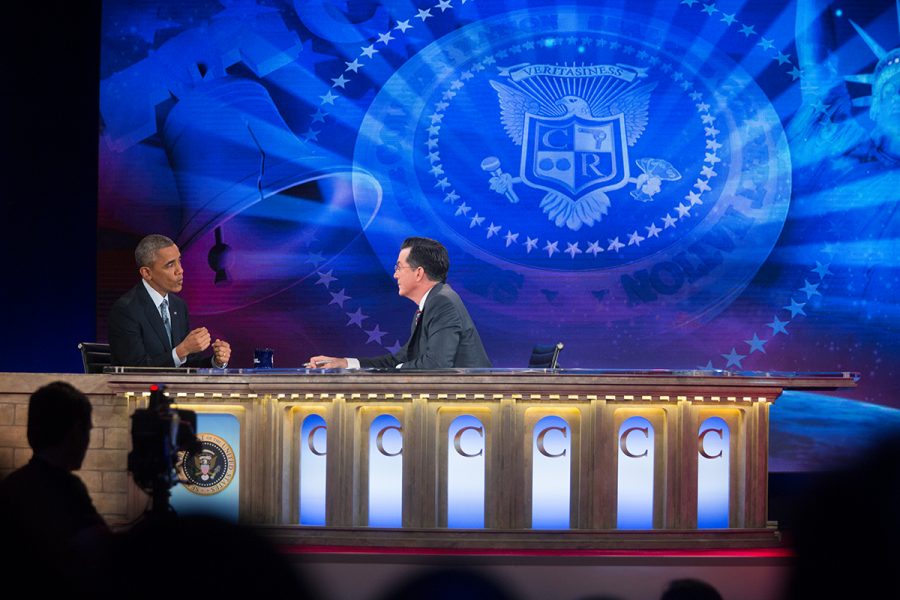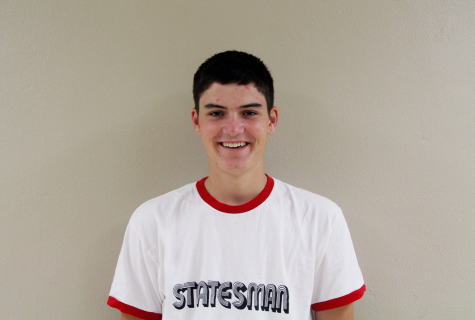Late night: America’s best informer
Stephen Colbert interviews former President Obama towards the end of his run on “The Colbert Report.”
December 6, 2019
With an increase in misinformation and lies in the world, it is becoming more difficult for news organizations to give proper coverage to the issues that matter. In a time of disarray like the time we’re in now, late night shows ultimately do a better job than the news in conveying information. Not only are they entertaining, late night shows are easily accessible and able to satirize a variety of topics prominent in daily news, which brings these important issues into the public eye. As a result, viewers of late night shows often end up being more informed than those who only watch news shows.
The idea of late night shows being better at conveying information than the news may be difficult to wrap your head around, yet their ability to “cut the crap” and reveal the truth is what makes them so effective. Late night TV is able to educate people on complex world issues through satire, avoid coverage of lies and poke fun at all sides of the political and social spectrums.
One instance in which a late night show did a better job than traditional media at covering a complex political issue is The Colbert Report’s investigation into campaign finance reform during the 2012 election. For the show, fake conservative pundit Stephen Colbert created a real super political action committee (super PAC) where he was able to showcase the many troubling issues surrounding campaign finance laws through a continuing satirical segment surrounding his very own super PAC. Colbert’s updates on his own super PAC helped to educate viewers on how super PACs could receive unlimited donations from anonymous donors, face essentially no possibility of being shut down for failing to meet FEC regulations and candidates could receive no consequences of putting out harsh advertisements against other candidates because politicians are not able to coordinate directly with super PACs.
To test the idea that Colbert viewers may actually be better educated on certain political issues than viewers of other media sources, the Annenberg Public Policy Center studied viewers who watched Colbert’s segments on campaign finance. In the study, this idea was confirmed: It was found that viewers of The Colbert Report were more informed about campaign financing and the role of money in politics than viewers of news networks and specific news shows. The study, “Stephen Colbert’s Civics Lesson” pitted networks such as CNN, Fox News, MSNBC and broadcast nightly news as well as radio and print media against The Colbert Report, and Colbert ultimately came out on top. By satirizing a real-life example of the troubles that have been caused by super PACs, Colbert was able to cover the situation better than all other media outlets, most of which were telling, rather than showing the many problems with campaign financing.
Alongside being able to use satire to get a specific point across and educate an audience, late shows are often more effective than the news in many ways, because they don’t have to cover all of the lies and rumors being spread in politics today.
After taking office, the Washington Post began an official lie counter on President Trump. At this time, President Trump has made over 14,000 false or misleading claims in his over 1,000 days in office. Many of these misleading claims need to be covered by traditional media because of how outrageous some of them are, and the coverage of these lies often takes up much of the 24-hour news cycle. By giving coverage to these lies however, news organizations can give them slight validation. Late shows, on the other hand, are able to quickly make fun of them and move on to the main cause of an issue at hand. With the ability to swiftly wipe away misleading information and claims, late shows are able to get rid of false narratives and end non-newsworthy stories.
Although some traditional media sources like broadcast journalism are important in sharing breaking news, the way news networks have gone for the entertainment value of conservative opinion versus liberal opinion over fact is troubling. This shift towards opinionated conservative versus liberal news programs helps create more of a political divide in the country and decreases the value of facts as a whole.
Pitting political ideologies against each other does not apply to late night. No matter who you are or what political party you affiliate with, if you do something ignorant in the public eye, late night shows will make fun of you. Whether it be through impressions, jokes or other means of humor, late night writers and hosts will not withhold making fun of any situation.
I’m not saying that we should abandon the news altogether, I’m saying that there are other ways to get information that effectively gets rid of misinformation, can better educate viewers and will make you laugh all at the same time. Late night shows may be a healthy swap or addition to a regular helping of the news today. Who knows, you might just learn something.









